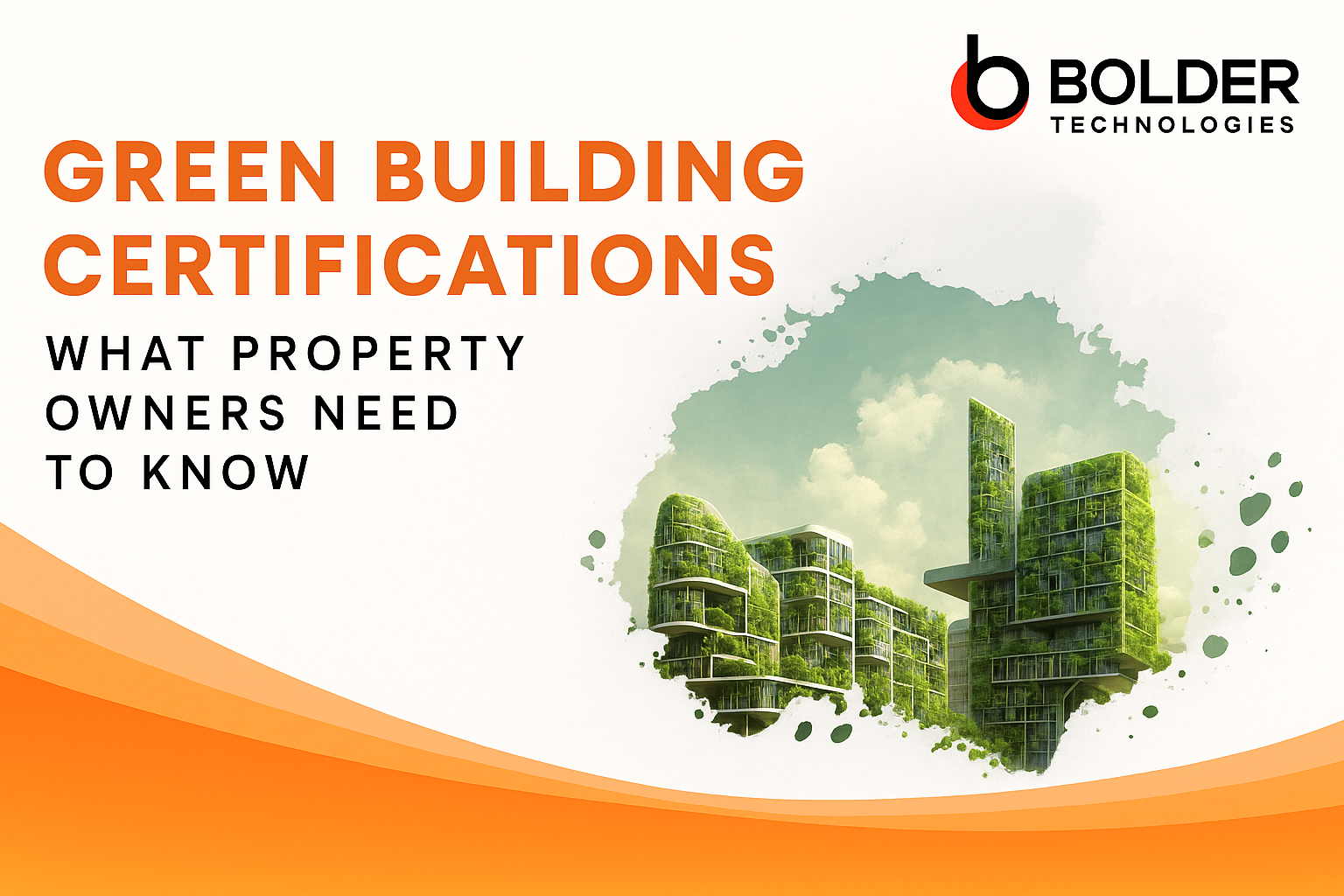As sustainability becomes more important in every industry, the real estate sector is also embracing green building practices. Green building certifications are now essential for property owners who want to ensure their buildings meet eco-friendly standards. These certifications help identify properties that are energy-efficient, environmentally responsible, and built with sustainable materials. In this blog, we will explore what green building certification is, the different types available, and why property owners should consider these certifications for their properties.
What is Green Building Certification?
Green building certification is a rating system that evaluates the environmental impact of a building. It ensures that the property is designed, built, and operated in a way that minimizes its environmental footprint. This includes factors like energy use, water efficiency, indoor air quality, and the materials used in construction. A sustainable property certification indicates that the property has met certain green building standards set by organizations dedicated to environmental sustainability.
Why is Green Building Certification Important?
Having a green building certification can benefit property owners in several ways. It can improve energy efficiency, reduce operating costs, and increase the property’s value. Additionally, properties with eco-friendly building certification are often more attractive to tenants who value sustainability. Certifications also ensure that a building complies with local regulations and can qualify for various incentives, such as tax breaks and rebates.
Popular Green Building Certifications
There are several well-known green building certifications that property owners can pursue. Let’s look at the most common ones in the real estate industry.
1. LEED Certification
The LEED real estate certification is one of the most recognized and widely accepted green building certifications. LEED stands for Leadership in Energy and Environmental Design. It evaluates buildings based on criteria like energy efficiency, water conservation, material selection, and indoor environmental quality. LEED certification has several levels, from Certified to Platinum, depending on how well the building meets sustainability standards.
LEED real estate is particularly popular in commercial real estate, where tenants are increasingly looking for energy-efficient properties. It can be applied to new constructions as well as renovations and existing buildings.
2. BREEAM Certification
BREEAM (Building Research Establishment Environmental Assessment Method) is another widely recognized green building certification. It originated in the UK and is now used internationally. BREEAM focuses on assessing the sustainability of buildings across several categories, including energy, water, and indoor air quality. It is available for a variety of building types, including offices, homes, and industrial properties.
BREEAM certification encourages property owners to adopt a holistic approach to sustainability, considering both the environmental and social impacts of the building.
3. WELL Building Standard
The WELL Building Standard is focused on the health and well-being of building occupants. This sustainable property certification evaluates factors such as air and water quality, lighting, and the comfort of indoor spaces. WELL certification is becoming increasingly important as tenants prioritize their health and well-being.
WELL is not just about reducing environmental impact but also about improving the quality of life for those who use the building.
4. Energy Star
Energy Star is a certification primarily focused on energy efficiency. Buildings that earn the Energy Star certification meet strict energy performance standards set by the U.S. Environmental Protection Agency (EPA). This certification is widely recognized in residential and commercial buildings.
An energy-efficient property with Energy Star certification can attract tenants who are looking to lower their utility costs. It also provides property owners with a clear indication of how well the building is performing in terms of energy consumption.
Benefits of Green Building Certifications for Property Owners
Investing in a green building certification can have several benefits for property owners. These benefits go beyond environmental impact and offer financial and marketing advantages.
1. Cost Savings
Energy-efficient properties reduce utility bills for both property owners and tenants. Green building standards focus on optimizing energy and water use, which can result in lower operational costs. Over time, the cost savings from reduced energy consumption can offset the initial investment in sustainable building practices.
2. Higher Property Value
Properties with sustainable property certification often have a higher market value. Potential buyers and tenants are increasingly looking for properties that have been built or retrofitted with energy-saving features and sustainable materials. A green building certification provides a clear indication that the property is environmentally responsible, which can help increase demand and raise property value.
3. Tenant Attraction and Retention
Many tenants today value sustainability and prefer to live or work in eco-friendly buildings. Green building standards such as LEED or Energy Star can help attract environmentally conscious tenants. These certifications also lead to higher tenant retention rates as tenants appreciate the energy-efficient and comfortable living or working environments.
4. Improved Health and Well-Being
Buildings that meet green building standards often offer improved indoor air quality, natural lighting, and overall comfort. These factors contribute to a healthier and more productive environment for tenants, which can improve tenant satisfaction and retention.
5. Government Incentives and Rebates
Property owners with green building certifications may be eligible for tax incentives, rebates, or grants. Many local governments offer incentives for buildings that meet specific sustainable property certification standards. These financial benefits can make the investment in green building practices more affordable.
How to Obtain Green Building Certification
Obtaining a green building certification involves several steps. While the process varies depending on the type of certification, the general steps are as follows:
- Understand the Requirements: Research the green building standards and select the certification that best fits your property.
- Conduct an Assessment: A professional will assess your building’s current performance in areas like energy efficiency, water use, and indoor air quality.
- Make Improvements: Based on the assessment, make the necessary upgrades or changes to meet the certification criteria.
- Submit for Evaluation: Submit your building for evaluation by the certifying organization. If the building meets the standards, you will receive the certification.
How API Integration Supports Green Building Certifications
Achieving green building certifications isn’t just about using sustainable materials—it also requires efficient data tracking and reporting. This is where API integration plays a powerful role. API-connected systems can pull data from energy meters, water management systems, and HVAC units to monitor and optimize building performance.
By integrating APIs with smart sensors and building management software, property owners can automate sustainability reporting and ensure compliance with certification standards like LEED or Energy Star. This not only streamlines documentation but also provides real-time insights to stay on top of green performance goals.
Conclusion
In conclusion, green building certification is an essential consideration for property owners who want to make their buildings more sustainable, energy-efficient, and attractive to tenants. Whether you pursue LEED real estate, Energy Star, or another certification, investing in green building standards can lead to long-term savings, increased property value, and improved tenant satisfaction. As the demand for eco-friendly buildings continues to rise, now is the perfect time for property owners to consider these certifications.
If you’re ready to make your property more sustainable and tech-enabled, Bolder Technologies can help you implement energy-efficient solutions through smart software and API integration. Contact us today to learn how we can support your journey toward green building certifications.
Need Help Integrating APIs?
Let us handle the tech so you can focus on growing your business.
🚀 Book a Free Consultation
